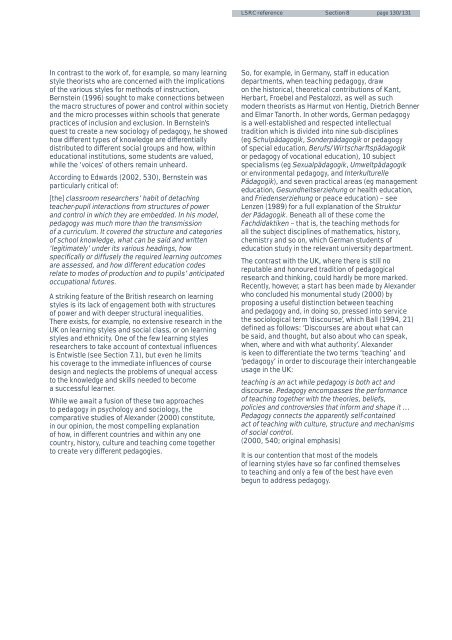learning-styles
learning-styles
learning-styles
You also want an ePaper? Increase the reach of your titles
YUMPU automatically turns print PDFs into web optimized ePapers that Google loves.
LSRC reference Section 8<br />
page 130/131<br />
In contrast to the work of, for example, so many <strong>learning</strong><br />
style theorists who are concerned with the implications<br />
of the various <strong>styles</strong> for methods of instruction,<br />
Bernstein (1996) sought to make connections between<br />
the macro structures of power and control within society<br />
and the micro processes within schools that generate<br />
practices of inclusion and exclusion. In Bernstein’s<br />
quest to create a new sociology of pedagogy, he showed<br />
how different types of knowledge are differentially<br />
distributed to different social groups and how, within<br />
educational institutions, some students are valued,<br />
while the ‘voices’ of others remain unheard.<br />
According to Edwards (2002, 530), Bernstein was<br />
particularly critical of:<br />
[the] classroom researchers’ habit of detaching<br />
teacher-pupil interactions from structures of power<br />
and control in which they are embedded. In his model,<br />
pedagogy was much more than the transmission<br />
of a curriculum. It covered the structure and categories<br />
of school knowledge, what can be said and written<br />
‘legitimately’ under its various headings, how<br />
specifically or diffusely the required <strong>learning</strong> outcomes<br />
are assessed, and how different education codes<br />
relate to modes of production and to pupils’ anticipated<br />
occupational futures.<br />
A striking feature of the British research on <strong>learning</strong><br />
<strong>styles</strong> is its lack of engagement both with structures<br />
of power and with deeper structural inequalities.<br />
There exists, for example, no extensive research in the<br />
UK on <strong>learning</strong> <strong>styles</strong> and social class, or on <strong>learning</strong><br />
<strong>styles</strong> and ethnicity. One of the few <strong>learning</strong> <strong>styles</strong><br />
researchers to take account of contextual influences<br />
is Entwistle (see Section 7.1), but even he limits<br />
his coverage to the immediate influences of course<br />
design and neglects the problems of unequal access<br />
to the knowledge and skills needed to become<br />
a successful learner.<br />
While we await a fusion of these two approaches<br />
to pedagogy in psychology and sociology, the<br />
comparative studies of Alexander (2000) constitute,<br />
in our opinion, the most compelling explanation<br />
of how, in different countries and within any one<br />
country, histor y, culture and teaching come together<br />
to create very different pedagogies.<br />
So, for example, in Germany, staff in education<br />
departments, when teaching pedagogy, draw<br />
on the historical, theoretical contributions of Kant,<br />
Herbart, Froebel and Pestalozzi, as well as such<br />
modern theorists as Harmut von Hentig, Dietrich Benner<br />
and Elmar Tanorth. In other words, German pedagogy<br />
is a well-established and respected intellectual<br />
tradition which is divided into nine sub-disciplines<br />
(eg Schulpädagogik, Sonderpädagogik or pedagogy<br />
of special education, Berufs/Wirtscharftspädagogik<br />
or pedagogy of vocational education), 10 subject<br />
specialisms (eg Sexualpädagogik, Umweltpädagogik<br />
or environmental pedagogy, and Interkulturelle<br />
Pädagogik), and seven practical areas (eg management<br />
education, Gesundheitserziehung or health education,<br />
and Friedenserziehung or peace education) – see<br />
Lenzen (1989) for a full explanation of the Struktur<br />
der Pädagogik. Beneath all of these come the<br />
Fachdidaktiken – that is, the teaching methods for<br />
all the subject disciplines of mathematics, history,<br />
chemistry and so on, which German students of<br />
education study in the relevant university department.<br />
The contrast with the UK, where there is still no<br />
reputable and honoured tradition of pedagogical<br />
research and thinking, could hardly be more marked.<br />
Recently, however, a start has been made by Alexander<br />
who concluded his monumental study (2000) by<br />
proposing a useful distinction between teaching<br />
and pedagogy and, in doing so, pressed into service<br />
the sociological term ‘discourse’, which Ball (1994, 21)<br />
defined as follows: ‘Discourses are about what can<br />
be said, and thought, but also about who can speak,<br />
when, where and with what authority’. Alexander<br />
is keen to differentiate the two terms ‘teaching’ and<br />
‘pedagogy’ in order to discourage their interchangeable<br />
usage in the UK:<br />
teaching is an act while pedagogy is both act and<br />
discourse. Pedagogy encompasses the performance<br />
of teaching together with the theories, beliefs,<br />
policies and controversies that inform and shape it …<br />
Pedagogy connects the apparently self-contained<br />
act of teaching with culture, structure and mechanisms<br />
of social control.<br />
(2000, 540; original emphasis)<br />
It is our contention that most of the models<br />
of <strong>learning</strong> <strong>styles</strong> have so far confined themselves<br />
to teaching and only a few of the best have even<br />
begun to address pedagogy.


